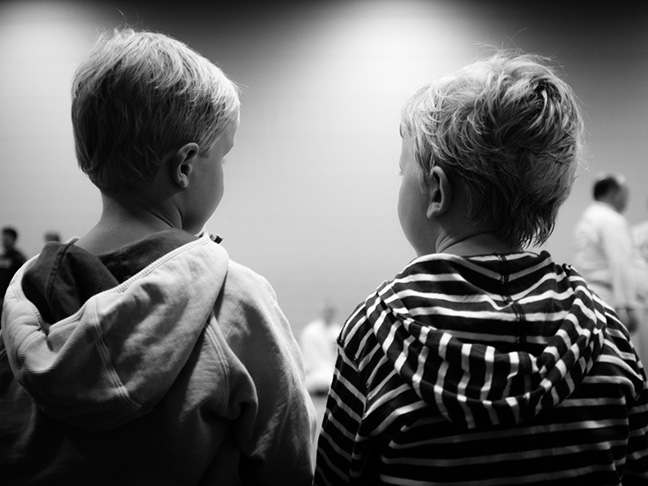Last year, I watched through the TV screen as the then captain of the Australian cricket team, Michael Clarke, cried openly and publicly over the death of his close friend Phillip Hughes. The surprise at his outpouring of emotion was clearly apparent in the media coverage over the following days, with many columnists celebrating his rawness as a step forward, and an example for boys and men everywhere.
While I watched and read, I reflected on the cultural norm we have created around emotions and men. We tell our boys to be “brave”, to be “strong” and not to cry. Little by little we raise them up to conceal their emotions. As a mum of two young boys, it has become alarmingly obvious to me that as a society we are bringing up men who hide their emotions in a misguided attempt to display strength.
My oldest son is a naturally emotional child. I have lost count of the number of times I’ve witnessed family and friends tell him to “toughen up” and that “big boys don’t cry”. My own husband even started out parenting him in this way. But what does the idea that boys don’t cry actually tell our children?
Does it teach them to understand their emotions, to recognise what triggers them, and to develop healthy and productive ways of dealing with them? I don’t believe so. It says that expressing emotions is weak, and teaches them that they should suppress these feelings.
I don’t just think it’s a bad idea, I believe it’s dangerous.
In Australia, three times more men commit suicide each year compared to women. Teens and young young men are at the greatest risk. Many professionals believe that the reluctance of men to acknowledge depression and express their emotions openly, is a significant factor in these statistics.
As boys grow up, we teach them that some emotions or ways of expressing emotions are okay for girls but not for boys. So often we inadvertently teach boys that anger shows strength and is okay, but that expressing sadness shows weakness and should be avoided. By doing so, we risk creating men who only know how to express anger or be violent when faced with strong emotions. Alternatively, we set them up to bury their emotions in alcohol or drugs, rather than express them openly in healthy ways.
The reality is that big, strong, brave men DO cry. I want my boys to know that and I’m trying to teach them to understand and manage their emotions in healthy ways. The reality is that emotions need to be expressed, they don’t just evaporate. I hope that as my boys grow up, they will understand that feeling and expressing grief, fear and sadness are just as valid and valuable for boys as for girls.
How my husband and I encourage emotional health in our boys
I want my boys to be able to express emotions freely. To feel safe and secure enough they can cry when the need arises, without feeling that it somehow compromises their masculinity. These are a few of the ways that we are trying to cultivate a culture of emotional openness in our family. You may find they also work for you.
Books
Starting from a young age we have read books about emotions and openly discussed these in our home. We’ve tried to avoid labelling emotions as good or bad and instead acknowledged and accepted them for what they are.
The Feelings Series by Trace Maroney is one of my favourite sets of books to help children recognise and name emotions, as well as understand practical and healthy ways of managing them.
Daily debrief
We’ve always encouraged a daily debrief in an attempt to keep communication open. I hope that as our boys grow older this will continue to be a way to connect with them beyond the superficial.
We ask the boys what their highs and lows were from the day and how they felt about different things that happened. This also gives us the chance to help them reflect on how they managed different situations and anything they’d like to change. My husband and I also share our highs and lows so that the boys get the chance to see how grown ups feel and react.
Talk less, listen more
It’s very tempting to try and solve my boys’ problems when they come to me. I don’t want them to be in pain and I want to fix whatever is wrong. The problem is that I can’t actually fix emotions. They are what they are, and trying to solve them often ends up teaching children that what they feel is wrong and needs fixing.
By trying to listen openly to what the boys tell us and how they are feeling it opens up communication. We ask questions and will offer ideas if they seem stuck and unable to manage an emotion or situation, but we try to listen more than we speak and avoid offering fixes.
Lead by example
For better or worse, children learn more from what we do than what we say. Because of this, we need to practice what we preach when it comes to emotions.
Teaching our boys to manage their feelings in healthy ways also means demonstrating dealing with our own emotions in healthy ways. Whether it is the way I manage my anger or frustration over their behaviour, or my response to disappointment, fear or sadness, I want my boys to see healthy and productive ways of managing emotions from the adults around them.
While we can’t control the events in our children’s lives that will bring about strong emotions, we can help to equip them with tools to help them manage when the time comes.
Do you have any other ideas for helping kids to deal with emotions in healthy ways?
More ways to raise healthy kids:








